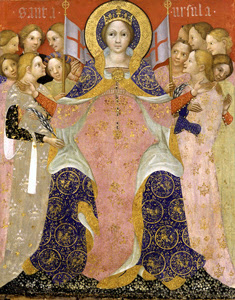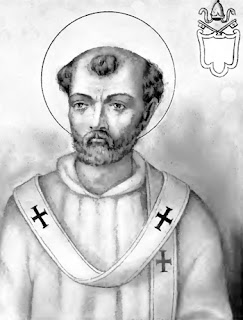We have now entered into the week which immediately precedes the birth of the Messiah. That long-desired Coming might be even tomorrow, and at furthest, that is, when Advent is as long as it can be, the beautiful feast is only seven days from us. So that the Church now counts the hours, she watches day and night, and since the 17th of December, her Offices have assumed an unusual solemnity. At Lauds, she varies the Antiphons each day, and at Vespers, in order to express the impatience of her desires for her Jesus, she makes use of the most vehement exclamations to the Messiah, in which she each day gives him a magnificent title, borrowed from the language of the Prophets.Epistle – 1 Corinthians iv. 1‒5
Brethren, let men regard us as the ministers of Christ, and the dispensers of the mysteries of God. Here now it is required among the dispensers, that a man be found faithful. But to me it is a very small thing to be judged by you, or by man’s day; but neither do I judge my own self. For I am not conscious to myself of any thing, yet am I not hereby justified; but he that judges me, is the Lord. Therefore judge not before the time; until the Lord come, who both will bring to light the hidden things of darkness, and will make manifest the counsels of the hearts; and then will every man have praise from God.Thanks be to God.
Dom Prosper Guéranger:
The Church here reminds the people of the dignity of the Christian priesthood. The occasion is an appropriate one, as the ordinations were held yesterday. She also brings before her sacred Ministers the obligation they have contracted of being faithful to the duties imposed upon them. But let not the flock judge their pastor, since all, both priest and people, are living in expectation of the day of our Saviour’s coming: not only of that second one, for which we are now preparing, but also of that last Coming which will be as terrible as the other two are dear to the hearts of men. After having spoken these words of stern admonition, the Church resumes the expressions of her hopes and her entreaties for the speedy coming of her Spouse.Gospel – Luke iii. 1‒6
Now in the fifteenth year of the reign of Tiberius Caesar, Pontius Pilate being governor of Judea, and Herod being tetrarch of Galilee, and Philip his brother tetrarch of Judea, and the country of Trachonitis, and Lysanias tetrarch of Abilina; Under the high priests Annas and Caiphas; the word of the Lord was made unto John, the son of Zachary, in the desert. And he came into all the country about the Jordan, preaching the baptism of penance for the remission of sins; as it was written in the book of the sayings of Isaiah the prophet: “A voice of one crying in the wilderness: Prepare ye the way of the Lord, make straight his paths. Every valley will be filled; and every mountain and hill will be brought low; and the crooked will be made straight; and the rough ways plain; And all flesh will see the salvation of God.”Praise be to you, O Christ.
Dom Prosper Guéranger:
You are near, O Lord, for the inheritance of your people has passed into the hands of the Gentiles, and the land which you promised to Abraham is now but a province of that vast empire to which your own is to succeed. The oracles of the Prophets are being rapidly fulfilled, each in its turn. The prediction of Jacob himself has been accomplished: The sceptre is taken from Judah. Everything is ready for your coming, O Jesus! Thus it is that you renew the face of the Earth. Deign, also, I beseech you, to renew my heart, and give me courage during these last few hours of my preparation for receiving you. I feel the need I have of withdrawing into solitude, of receiving the baptism of penance, of making straight all my ways: O divine Saviour, let all this be done in me, that so my joy may be full on the day of your coming.



